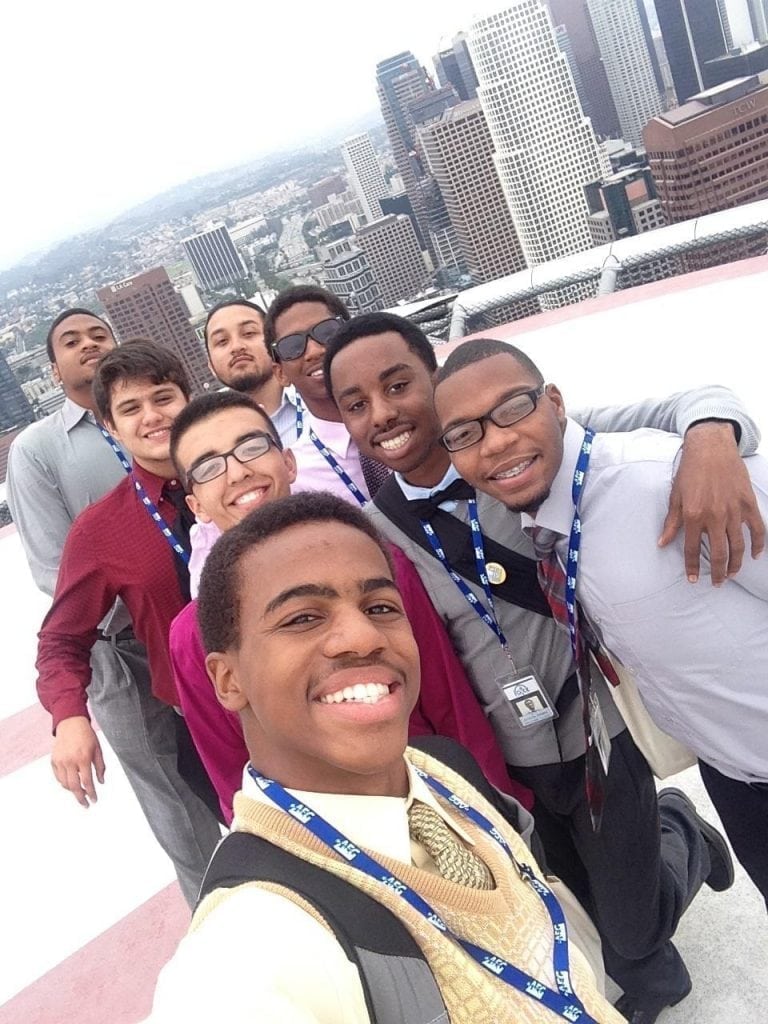
Students from L.A. Speech and Language Therapy Center participate in the pre-employment program at AEG. PHOTO COURTESY L.A. SPEECH AND LANGUAGE THERAPY CENTER
“As I wandered the resource fair with both my kids in tow, it became strikingly clear how limited the options would be for Nicholas post-high school.”
“There is a lot of money invested in these kids when they are young, but there is significantly less as they get older. You feel as if you’re on your own.”
These are real thoughts plaguing parents of high school-age children with autism spectrum disorders (ASD). As children with ASD mature into young adults, professionals and parents are challenged to create opportunities and options to help them become independent and able to find and, more importantly, maintain meaningful employment.
In response to the increasing incidence of autism, policymakers have devoted more and more resources to serving this population, and children are provided a range of therapeutic supports throughout their educational careers. Autism services cost an average of $2.3 billion annually, but we have failed to properly plan beyond high school and to provide help for students with ASD seeking employment.
Young adults with ASD have more trouble finding work and are more likely to be unemployed during their first three years after high school than young adults with other disabilities. Fifty-five percent of young adults with autism are unemployed six years after high school. These individuals suffer depression, social isolation and often times never return to the workforce. And those who do find jobs often receive substantially lower wages when compared to their peers with other disabilities.
The employment situation is even worse for those individuals with ASD who struggle with conversational and functional skills. Opportunities for them have dwindled as the economy has shifted in recent decades from manufacturing toward service-sector jobs requiring greater social interaction. The challenges are greater still for individuals from low-income households, who often lack adequate transition preparation and have limited access to services, contacts and potential job opportunities.

Participants in the L.A. Speech and Language Therapy Center employment readiness program take in the Los Angeles skyline. PHOTO COURTESY L.A. SPEECH AND LANGUAGE THERAPY CENTER
Traditional vocational training programs targeting young adults with ASD could do a better job of ensuring their success in the workplace if they placed greater emphasis on the social skills needed to navigate effectively in the working world. Many programs focus primarily on finding jobs without taking into consideration the students skills, interests or passions. This makes it even more difficult for individuals who have higher potential to achieve meaningful employment based on their abilities and interests.
Our employment-readiness program at L.A. Speech and Language Therapy Center serves a diverse group of students with a vast range of employment-related interests. Students receive intense workplace social-skills training and are then placed in customized internships or job-shadow opportunities of their choice. Tailored placements such as these provide our students an opportunity to practice their “dream jobs” in a safe setting without the risk of failure or long-term commitment. This approach opens their eyes to the infinite number of employment opportunities available while providing them the social skills and confidence needed to attain and retain employment in an area of interest to them.
For example, we secured an internship at the Children’s Defense Fund for a student who has an interest in social justice and nonprofit work. Prior to joining our program he had been terminated from his job at a local supermarket. He has now found his niche, is extremely happy, exudes confidence and is focused on the next phase of his life, which includes community college and then law school. The nonprofit has expressed an interest in hiring him part time while he attends community college. Another student is pursuing a career in animation and will attend a four-year art college. Another has parlayed his interest in music into a successful mobile DJ business.
Our workplace social-skills program currently offers five employment tracks, which include exposure to corporate America, general vocational training, childcare, social justice and technology. Our newest track will include the opening of a mock UPS store, providing students the opportunity to practice a range of employment skills from basic customer service to weighing and measuring packages to management and sales.
All of our students articulate their hopes and dreams for the future, and we believe that with careful planning, exposure to targeted training experiences and support, failure is not an option for them.
The benefits gained by our students transcend the autism community. Adults with ASD who can use appropriate social skills at work and in the community will break down the barriers of discrimination and encourage greater acceptance and inclusion. With the increasing number of young people with autism reaching adulthood, it is incumbent upon us to prepare them for the workforce and prepare the workforce for them. Targeted workplace social-skills training can result in meaningful employment, opportunities for socialization, income, independence and purpose.
Pamela Wiley, Ph.D., CCC-SLP, is president and founder of L.A. Speech and Language Therapy Center, providing comprehensive treatment and services to children with autism spectrum disorder and other diagnoses. Learn more at www.speakla.com.


























